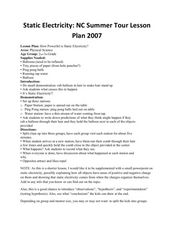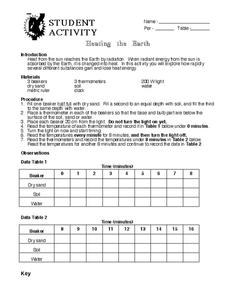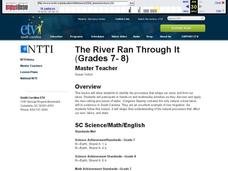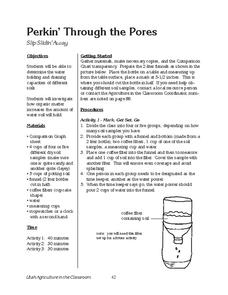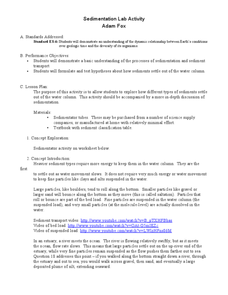Curated OER
Science: Dissolved Oxygen and Water Quality Sampling
Students perform tests to determine the level of oxygen dissolved in water. After examining a table displaying the temperature and solubility of water, they examine the three stages involved in the test. Upon completion, students explain...
Curated OER
The Magic Of Static Science Station Experiment
In this magic of static electricity set of station activities worksheets, students perform 4 activities with static electricity including popping corn, jumping peanuts, weird water, and dancing balloons. They complete the recording...
Curated OER
The Water Cycle
Students create an "animated" water cycle wheel that illustrates where water comes from and where it goes.
Curated OER
Earth & Space Science: Holding it Together
Students estimate how many drops of water can fit onto the surface of a penny and then test their hypothesis to find out. They also experiment with bubbles.
Curated OER
Solubility Lab
In this solubility worksheet, students test a variety of polar and non polar substances to determine which ones will dissolve in vegetable oil and which ones will dissolve in water. Students collect data and answer 2 questions about...
Curated OER
Function of a Stem
Fourth graders perform an experiment to test the function of a stem. In this science lesson, 4th graders write a description of their investigations. Students also explain how the stem interacts with the rest of the plant. Students use...
Curated OER
Floodplain Modeling
Young scholars simulate the impact of fluctuating river volumes on structures and landforms. They experiment with table top-sized riverbed models and water. Students consider how human design can help mitigate the effects of a flood.
Curated OER
How Powerful is Static Electricity?
Students break up into groups to complete a demonstration rubbing a balloon in hair make their hair stand up. Thus, they conclude static electricity. They also experiment with a paper station, ping pong station and a water station...
Curated OER
Heating The Atmosphere
In this science worksheet, students look for the answers to finding the correct temperatures that match the location in the atmosphere.
Curated OER
How Much Oxygen Is In The Air?
In this science worksheet, learners take a close look at the composition of air while focusing on the content of oxygen. They use clay to model the amounts.
Curated OER
Locating the Salt Front - Section 1
In this salt front of the Hudson River worksheet, 7th graders first read an excerpt about the lower portion of the Hudson River that is an estuary. Then they use a colored pencil to plot salinity data from the table shown on a graph,...
Curated OER
Observing Osmosis
Students investigate osmosis using egg cells with the shells removed. In this osmosis lesson plan, students remove the shell of an egg by letting it soak in vinegar for two days. They take measurements and observe the cell. They soak the...
Curated OER
Fizzy Pop
Fifth graders compare and identify variables that affect the rate of a chemical change using Alka-Seltzer, water, ice, and hot water. They time how long each variable takes to pop the canister into the air, and record the results on a...
Curated OER
Composition of the Atom
Learners investigate the structure of the atom and its composition. In this atom structure lesson, students find the area of cut out circles and drop pens into the circles. They count the number of marks in the circles and relate their...
Curated OER
The River Ran Through It
Students identify the processes that shape our rivers and form our lakes. They participate in hands-on and multimedia activities as they discover and apply the river-cutting processes of water.
Curated OER
Erosion: Natural or Unnatural
Students explore how water has the power to erode, how developing the land (building roads, buildings and parking lots) increases the amount of water reaching our rivers, and how this greater quantity of water increases erosion. They...
Curated OER
Perkin' Through the Pores
Students investigate how organic matter increases the amount of water soil will hold. In this water soil lesson plan, students use soil and measure water amounts using organic matter. Students measure the water holding capacities.
Curated OER
How Many Drops of H2o Can Fit on a Penny?
In this properties of water instructional activity, students explore the surface tension and cohesion properties of water compared to other liquids in a 2 part experiment.
Curated OER
What Makes a Habitable Planet?
Students list conditions necessary for humans to survive. They then mix yeast with a nutrient broth consisting of warm water and table sugar in a plastic bottle, capping it with a party balloon and compare the factors within the bottle...
Curated OER
Periodic Properties Lab
Young scholars investigate the periodic properties of elements in the periodic table. In this periodic properties lesson plan, students experiment with elements from the Alkaline Earth Metals, the Halogens, the Transition Metals, and for...
Curated OER
Sedimentation Lab Activity
Students predict how sediments in a water column will settle. In this earth science lesson, students examine the layers of sedimentation. Students are given sediments to place into a column of water and observe how they settle....
Curated OER
Halogens
Students identify the elements that belong to the halogen family on the periodic table. In this chemistry lesson, students describe the common characteristics of elements in this group. They research about hydrochloric acid's effect on...
Curated OER
Disposable Diaper Comparison and Mystery Powder Identification
Students investigate which diaper is the most absorbent. In this chemistry lesson, students calculate how much water is absorbed by diapers. They identify an unknown powder based on physical and chemical properties.
Curated OER
Dynamic Earth
Students show how earthquakes affect sea waves. In this tidal waves instructional activity students use a rubber mallet on a table to create waves in a box on top of the table. They experiment with striking the mallet in different...







